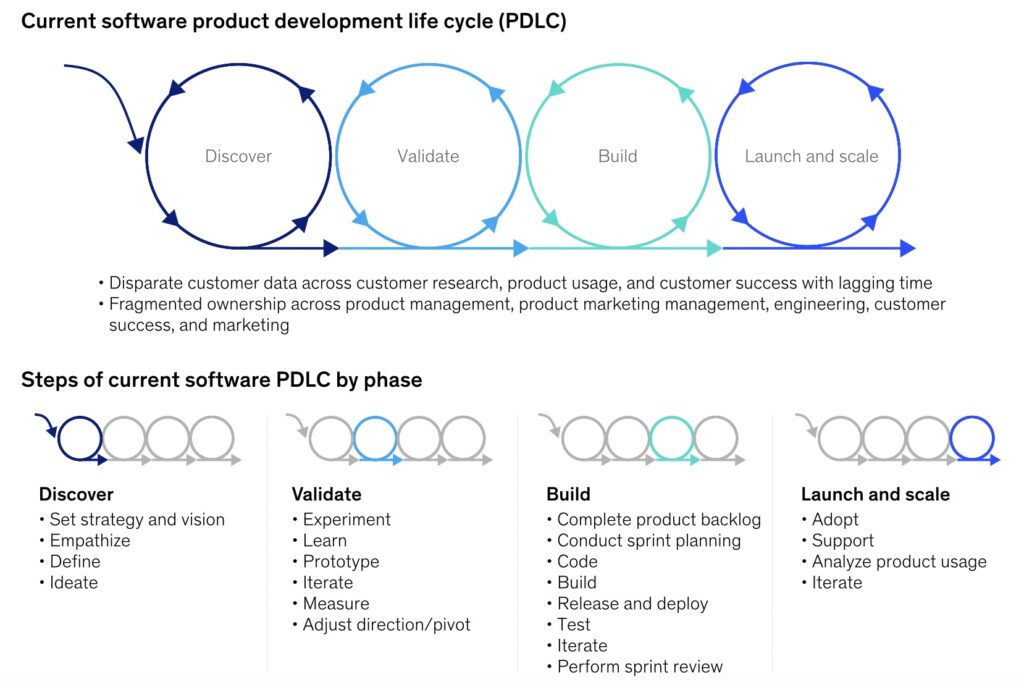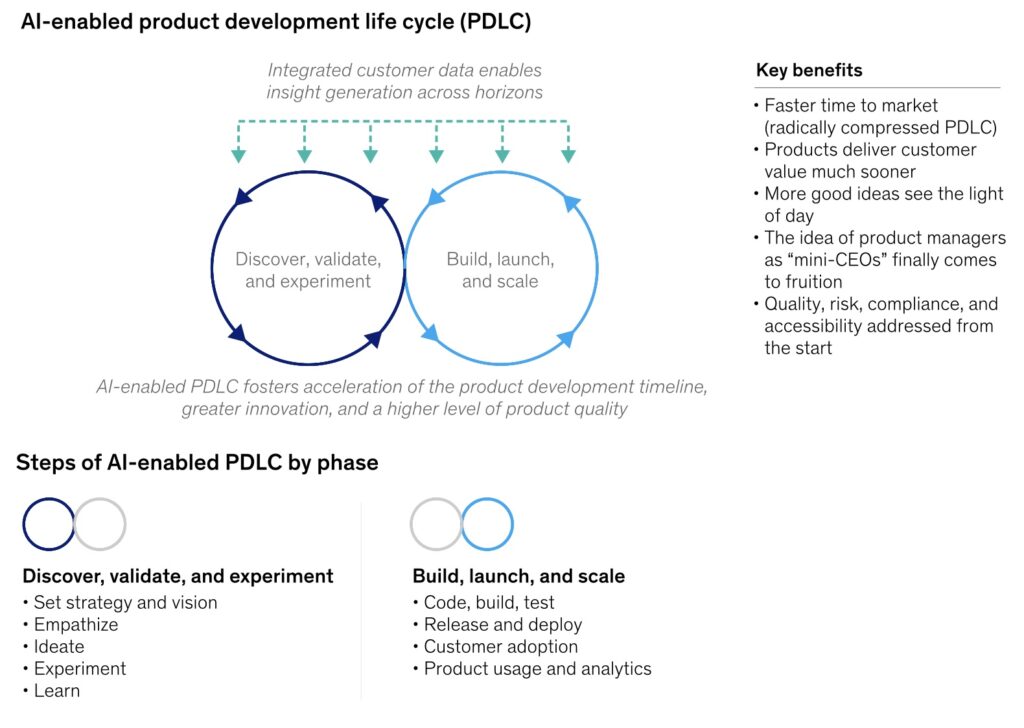Currently, the software product development lifecycle sees fragmented ownership and multiple pain points.

AI-driven product development lifecycle will enable faster, more customer-centric, and higher-quality innovation.

As part of its broad “overhaul” of the product development process, AI will bring five fundamental changes to the software PDLC, which will profoundly impact speed, quality, value, and overall innovation.
Faster Time to Market
AI shortens the journey from the early strategy and vision stages to late-stage product deployment and scaling.
- AI automates time-consuming routine tasks such as project management, market analysis, performance testing, feedback analysis, and documentation freeing Product Managers, Engineers, and Designers to focus on higher-value tasks that require human creativity and judgment like product vision and strategy setting to concept development and feature prioritization.
- AI tools save time and provide better information so teams can create multiple iterations of a product, improving its market fit.
- AI tools help organizations conduct faster market testing and respond more swiftly to customer feedback, consumer changes, and shifting dynamics or trends, which result in better product experiences.
Products Deliver Customer Value Sooner
AI is integrating fragmented data sources of customer feedback and product usage into the development cycle, making it possible to build products in an accelerated manner that are linked to customer value from the outset.
- AI can stitch together data from initial customer research during the discovery and viability phases along with telemetry, service ticket data, and support feedback to track impact end to end.
- AI tools can also integrate real-time customer input, social media sentiment/ interactions, and competitive research alongside historical data and market trends.
- Teams using this approach can gain actionable insights to help create more rigorous and customer-centric product concepts, thus increasing successful launches.
More Good Ideas See the Light of Day
Using AI for prototyping and testing new product ideas significantly reduces the resources required in the viability stage.
- Product teams can run many more experiments, raising the odds of promising ideas getting due consideration.
- AI can help analyze data sets and be an unbiased element in the conversation.
- After strategic decisions are made, AI can then help continuously monitor metrics and evaluate the progress.
Product Managers Can Truly be the “Product CEO”
With AI, PMs will now have the tools to have end-to-end oversight from ideation to value realization.
- Leverage AI tools to rapidly prototype products, create marketing collateral (including product one-pagers and pitch decks), and build technical proofs-of-concept (POCs).
- With AI, PMs can move ideas from conception to tangible demonstrations more rapidly, with more end-to-end accountability.
- AI tools can help PMs analyze meeting notes and call transcripts to provide valuable internal feedback, helping employees learn and receive product coaching more frequently and efficiently.
Quality, Risk, Compliance, and Accessibility are Addressed in Parallel with Coding and Building
AI solutions range from automated code compliance and accessibility checks to threat detection and prevention to vulnerability scanning when developers write code.
- AI can set enterprise-wide security and compliance guidelines across code repositories so that developers’ code can be compliant immediately.
- AI can speed up code reviews by finding and fixing vulnerabilities and stylistic issues.
- AI-enable accessibility can ensure that it is ‘built in’ from the start of the PDLC rather than bolting it on after the fact.
Ultimately, this holistic transformation should result in higher-quality products reaching customers faster, putting their needs at the center of the development process and delivering greater value (to them and software providers) in the AI-enabled future.
—
Gnanasambandam, Chandra; Harrysson, Martin; Singh, Rikki, Chawla; Aditi. How an AI-enabled software product development life cycle will fuel innovation. McKinsey & Company. February 10, 2025. https://www.mckinsey.com/industries/technology-media-and-telecommunications/our-insights/how-an-ai-enabled-software-product-development-life-cycle-will-fuel-innovation